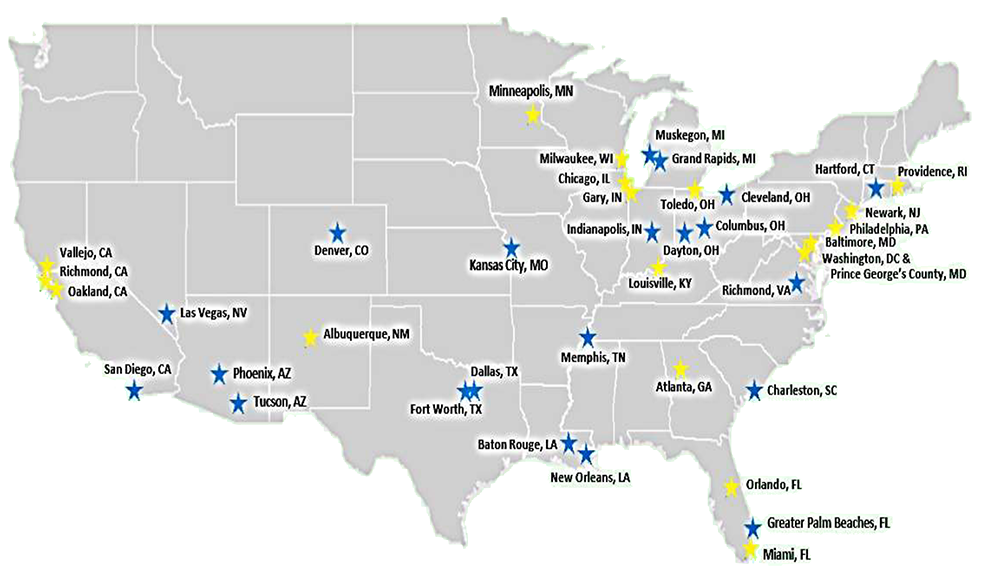FHC JOINS NFHA AND 19 LOCAL FAIR HOUSING GROUPS IN FILING A FEDERAL LAWSUIT AGAINST MORTGAGE GIANT FANNIE MAE
- At December 06, 2016
- By fhfla
- In News
 0
0
Washington DC- The Fair Housing Center of the Greater Palm Beaches (FHC) joined the National Fair Housing Alliance (NFHA) and nineteen fair housing organizations from across the country to announce the filing of a housing discrimination lawsuit against Fannie Mae in federal district court in San Francisco, CA. The civil rights groups allege that Fannie Mae fails to maintain its foreclosed homes (also known as real estate owned or “REO” properties) in middle- and working-class African American and Latino neighborhoods to the same standard to which it maintains its foreclosures in predominantly white neighborhoods. This practice violates the federal Fair Housing Act.
The fair housing organizations investigated over 2,300 properties owned by Fannie Mae, collected evidence on over 35 data points for each foreclosed home, and documented differences in treatment based on the race and/or ethnicity of the neighborhood in which the Fannie Mae foreclosure was located. The evidence includes over 49,000 photographs.
Read Press Release
Read Complaint/Lawsuit
View Powerpoint Presentation
View Exhibit A (Fannie Mae Service Checklist)
Palm Beach Post
WPTV Channel 5 News
FHC JOINS FAIR HOUSING GROUPS ACROSS THE COUNTRY DEMANDING WESTCHESTER ENFORCEMENT
- At June 16, 2016
- By fhfla
- In News
 0
0
In papers filed in Federal District Court in the Southern District of New York, the Fair Housing Center of the Greater Palm Beaches (FHC) joined with nine other civil rights from across the country in urging the Court to consider fully the facts and perspective brought to the Court’s attention in a May 11th letter from the Anti-Discrimination Center (ADC). Pointing out that the failure to enforce the consent decree against Westchester County will embolden others across the country to perpetuate segregation, the groups asked the Court to order the robust remedies sought by ADC.
In addition to FHC, the groups filing the papers are: Central Ohio Fair Housing Association, Disability Law Center, Enhanced Section 8 Outreach Program, ERASE Racism, Fair Housing Center of Central Indiana, Fair Housing Center of the Greater Palm Beaches, Fair Housing Council of Orange Country, Inclusive Communities Project, Miami Valley Fair Housing Center and the National Fair Housing Alliance.
Download Attachment:
CLICK HERE TO VIEW: Westchester Amicus Brief“FHC Taking City of Boca Raton and Major Housing Providers to Federal Court for Housing Discrimination Against Families with Children”
- At May 10, 2016
- By fhfla
- In News
 0
0
The Fair Housing Center of the Greater Palm Beaches, Inc. (FHC) today filed a federal lawsuit against the City of Boca Raton, and the owners and operators of student housing developments in Boca Raton, Park Partners Residential LLC, Giles Capital Group, LLC, Lewis Rental Properties, Rosemurgy Properties, LLC, and Preiss Company, LLC.
The FHC suit alleges that the Defendants discriminate in the rental of housing based on familial status, in violation of the Federal Fair Housing Act of 1968, as amended. The suit arises as a result of a FHC testing investigation that showed that homeseekers with minor children were treated differently from homeseekers without minor children.
In early 2012, the City of Boca Raton passed Ordinance 5193, which created a new zoning district for student housing. The ordinance defines student housing as “housing that is specifically designed for occupants who have been accepted for full-time admission, or are enrolled in and attend Florida Atlantic University (“FAU”), Lynn University or Palm Beach State College in a 4-year degree program(s).” The ordinance requires that each “student sleeping room” contain “1 bed, 1 private closet, and 1 private bathroom,” and that the minimum floor area of each sleeping room “shall be 150 square feet per occupant.” The zoning restrictions discriminate against minor children and there are no exceptions in the ordinance even for the students with dependent minor children.
Additionally the City’s square footage requirement within the student zoning district, is significantly more restrictive than the occupancy limitations imposed by the Palm Beach County Housing Code. According to the housing code, a sleeping room with 150 square feet of floor area is sufficient space for two occupants. The square footage requirement in Ordinance 5193 is also more restrictive than the U.S. Department of Housing and Urban Development’s (HUD) policy on occupancy standards, which provides that an occupancy policy of two persons per bedroom, as a rule, is reasonable under the Fair Housing Act.
The private Defendants own and operate “student housing” apartment buildings (“University Buildings”) in Boca Raton. One of the buildings, University Park, is located within the City’s student zoning district and all of the buildings are marketed exclusively to students. They are private housing communities, which are not on any university or college campus or otherwise associated with an educational institution. The apartments in the University Buildings are leased as individual student sleeping rooms, so that each sleeping room has its own lease. This lease requirement precludes minor children from the apartments because they cannot legally sign a lease. Further, only one person may occupy a bedroom, regardless of the square footage of the room.
The inevitable and foreseeable result of the leasing policies at the University Buildings and of Ordinance 5193 is that students with minor children are excluded from living in these private residences. The zoning code and the University Buildings were not developed in response to any demonstrated need for student housing. Officials from the largest nearby school, FAU, opposed the ordinance stating that private, off-campus student housing was unnecessary. Instead, it appears that the owners and operators of the University Buildings chose to create student housing, effectively precluding minor children, as a way to maximize their profits from the buildings.
The very colleges singled out by the City of Boca Raton in the passage of Ordinance 5193 recognize that many of their students are parents. FAU, with a total enrollment of more than 25,000 students, offers childcare on campus that aims to “provide care and a high-quality educational environment/experience for the children of FAU students.” Palm Beach State College, with a total enrollment of more than 15,000 students, provides resources on its website for students who may be in need of subsidized childcare. Most students at Lynn University are required to live on campus, but Lynn makes an exception for students with children.
“The City of Boca Raton received thousands of taxpayers’ dollars by certifying to the U.S. Department of Housing and Urban Development (HUD) that they would affirmatively further fair housing within its city limits. This illegal ordinance is a clear violation of the Fair Housing Act and runs contrary to that certification to HUD”, stated Vince Larkins, FHC President/CEO.
The plaintiffs are represented by Attorneys Reed Colfax, and Tara K. Ramchandani, of the law firm of Relman, Dane & Colfax, PLLC, based in Washington, DC., and Attorney Maxine Cheesman, of the Law Office of Maxine D. Cheesman, P.A. in West Palm Beach, Florida.
Anyone who believes they have been discriminated against at University Park, University Square, or University View may call the FHC’s toll-free hotline, at 1-877-910-FAIR.
National Fair Housing Alliance Welcomes New Fair Housing Act Guidance on Use of Criminal Records in Housing Transactions
- At April 04, 2016
- By fhfla
- In News
 0
0
WASHINGTON, DC— Shanna L. Smith, President and CEO of the National Fair Housing Alliance (NFHA), issued the following statement commending the U.S. Department of Housing and Urban Development (HUD) on its Fair Housing Act guidance concerning the use of criminal records in housing decisions:
“African-Americans and Latinos are disproportionately likely to have a criminal record compared to White Americans, and this is a direct result of our nation’s mass incarceration epidemic and centuries-long disparities in the way law enforcement has targeted different communities based on race and ethnicity. As our nation begins to turn back this disturbing reality and ease re-entry back into society, we must affirmatively commit to removing all barriers that stand in the way of achieving success for families and the formerly incarcerated. The Fair Housing Act is one tool to help achieve that goal.”
“Finding safe and stable housing is a foundation for successful re-entry into society, but these opportunities remain elusive for people with a criminal history and more so for those who are people of color. Today’s HUD guidance will help make clear how housing providers can appropriately consider criminal history, and that blanket prohibitions on people with any criminal history can have a discriminatory effect on people of color and violate the Fair Housing Act. The guidance also clarifies how differential treatment in using criminal history information can similarly be a violation of the Act.”
“The fair housing movement is proud of HUD’s policy announcement. We look forward to working with HUD and housing providers to better apply this important guidance, and we hope to work with HUD to establish similar guidance for other protected classes, including for people with disabilities with a criminal history related to their disability.”





